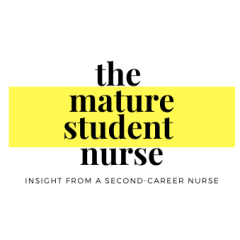I have been working without my preceptor since the beginning of August, or for about three weeks. I’m lucky to work in a place that values teamwork and helping one another because other nurses have helped or guided me on almost every shift since I’ve been off preceptorship. One of the biggest things I’ve learned and the best advice I’ve received as a new grad is to ASK FOR HELP.

I have no problem asking for help or clarification when I am unsure how to do something. However, I get flustered when asking someone to do things for me when I think I can or should do such things for myself or my patient. At some point in my shifts, I may start falling behind, or the unexpected happens; if I want to stay on track or not be completely off-schedule, I must ask for and accept help and support. Other nurses have started IVs or completed bladder scans at the end of my shift for me, so I can finish passing meds or complete tasks for my other patients. While uncomfortable for me, I’ve learned to ask for help and accept the support and generosity of others. (Note to self: Never mess with a funky IV contraption that ED set up – it’s probably the only way they got it to work. Trying to “fix” it just before shift change can mess it up and cause you to lose IV access, requiring a new IV start as you scramble to do morning meds).
I’m on an exponential learning curve and make mistakes. Each week, I discover new ways of doing things inefficiently, incorrectly, or in ways that doctors, patients, or my manager do not prefer. [Un]fortunately, I am learning through experience and by doing. I make mistakes or feel so uncomfortable or irritated with my performance that I must consider various ways to improve or avoid making mistakes in the future to feel competent and more confident about my work.
Communication

I’m still learning how various doctors want to communicate with nurses during the night shift. Some doctors prefer secure chat, while others only want phone calls. I’ve learned preference, of course, because I’ve utilized the opposite method of communication to what some doctors wish to use. Meanwhile, my manager advised only calling doctors in an email that I didn’t read until days after sending numerous notifications to doctors via secure chat. (I now try to be more diligent about checking my work email). Ultimately, if I need to urgently communicate with a doctor about a patient condition or issue, I will use whatever method allows me to get a hold of them. I’ve also learned that it’s better for a doctor to be upset because I communicated something they thought unimportant instead of not sharing a potential issue with a doctor. Also, I need to document every attempt at trying to reach a doctor. I had a doctor upset with me for contacting him so late in the evening, even though I called his answering service multiple times, hours earlier.
Compare and Despair
To be clear, my leadership or staff have not shamed me for my shortcomings. My leaders have been genuinely supportive and offer non-discriminatory methods of correction. I don’t feel singled out by my mistakes, and I know I’m not alone when I speak to others in my cohort. However, I measure my success by using others’ progress as my ruler. For example, one of my cohort-mates calmly activated and engaged in rapid response for one of his patients on only his fourth day without a preceptor. He received accolades from the leadership team, and our manager shared his praise with the rest of our cohort. I was so impressed and in awe by what my colleague faced and how he acted in crisis.
In comparison, during my second week, one of my patients fell. I was getting the patient’s medication in the med room when the fall occurred. Falls require an incident report and are a pretty big deal for hospitals. Thankfully, my patient did not get injured and was apologetic for the fall. I felt embarrassed and ashamed for having an incident and kept replaying the scenario and trying to understand what I could have done differently or how much worse it could have been. I have been vigilant with my patients’ bed alarms and documenting their fall education since that event.
Discovering What I Don’t Know
I have done things in less than ideal ways and made mistakes and will likely make more mistakes. However, instead of dwelling on my mistakes, I can focus on continual improvement. Am I learning from my past actions or others’ mistakes? Can I figure out how to minimize the chances for errors or prevent making the same mistakes again? Can I improve on my processes or methods? As a new nurse, I have so much room for improvement and growth. I don’t even know what I don’t know, and I keep discovering this each week.
I recently learned that I needed to administer or waste narcotics within a specific time from retrieving the medication(s) from our Omnicell. For the past three months, I dispensed and gave narcotic drugs while likely exceeding this time limit because I hadn’t known this guideline existed. I had no idea until a nurse on the floor mentioned it to me this month, and my manager emailed the team after his periodic department audit. Now that I know about this limit, I try to avoid other tasks after pulling a narcotic that may prevent me from immediately administering the medication to the patient.

Moving Forward
As I’ve shared in previous posts, I’m still adjusting to working nights and have had difficulty sleeping. I think it’s also because I’ve developed stress-induced insomnia: I replay how my shifts went and how I could have done better. I can beat myself up about things I didn’t know or events I wished I had handled differently, or I can use these experiences as lessons and move forward.

I write this blog to help others and because it allows me to process my experiences as a new nurse. It’s a way to release the ideas in my head so they don’t ruminate in my mind. My blog is also a reminder to focus on neutral or positive thoughts for self-encouragement and coaching. I consider how I would talk to a friend if they were experiencing what I was experiencing.
If you are a new nurse with anxiety before/during/after your shifts or beat yourself up over your mistakes, I am with you. Without realizing it, I survived the last night shift I had without caffeine; I think my stress response kicked in, and I was running on adrenaline. (Also, a unit secretary pointed out I was having hand tremors with the amount of caffeine I was consuming, so I’ve been trying to reduce my caffeine intake). I’m still figuring out the best ways to relieve my stress and practice self-care, just as I’m learning how to be the best nurse I can be. Besides lowering my caffeine intake, I try movement (yoga or hiking), meditating, blogging/journaling, or confiding in other nurses. It doesn’t matter how old, young, experienced, or inexperienced you are – there’s always room for growth and self-discovery.
This blog chronicles my nursing journey and serves as a journal of sorts, but I share my life to support and encourage others’ success and progress, too! I would love to hear from you: How do you give yourself grace while developing and growing? How do you move forward from mistakes? How do you practice self-care? For ideas, check out the past IG post I had about the Alphabet of Coping Mechanisms: https://www.instagram.com/p/B3uuR4ynB_9/


